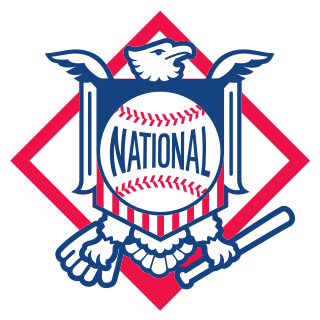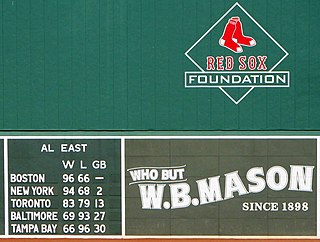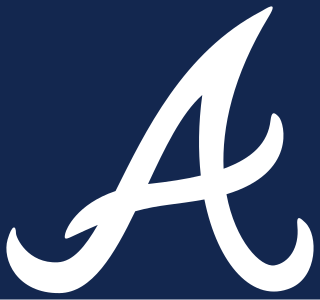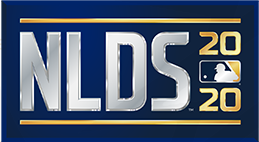In Major League Baseball, the National League Division Series (NLDS) determines which two teams from the National League will advance to the National League Championship Series. The Division Series consists of two best-of-five series, featuring each of the two division winners with the best records and the winners of the wild-card play-offs.

The Miami Marlins are an American professional baseball team based in Miami. The Marlins compete in Major League Baseball (MLB) as a member club of the National League (NL) East Division. The club's home ballpark is LoanDepot Park.

The National League of Professional Baseball Clubs, known simply as the National League (NL), is the older of two leagues constituting Major League Baseball (MLB) in the United States and Canada, and the world's oldest extant professional team sports league. Founded on February 2, 1876, to replace the National Association of Professional Base Ball Players (NAPBBP) of 1871–1875, the NL is sometimes called the Senior Circuit, in contrast to MLB's other league, the American League, which was founded 25 years later and is called the "Junior Circuit". Both leagues currently have 15 teams.

Interleague play in Major League Baseball refers to regular-season baseball games played between an American League (AL) team and a National League (NL) team. Interleague play was first introduced during the 1997 Major League Baseball season. Prior to that, matchups between AL teams and NL teams occurred only during spring training, the All-Star Game, other exhibition games, and the World Series. Unlike modern interleague play, none of these contests, except for the World Series, counted toward official team or league records.

The American League East is one of Major League Baseball's six divisions. MLB consists of an East, Central, and West division for each of its two 15-team leagues, the American League (AL) and National League (NL). This division was created before the start of the 1969 season along with the American League West division. Before that time, each league consisted of 10 teams without any divisions.
The National League Central is one of Major League Baseball's six divisions. This division was created in 1994, by moving two teams from the National League West and three teams from the National League East.
The National League West is one of Major League Baseball's six divisions. This division was created for the 1969 season when the National League (NL) expanded to 12 teams by adding the San Diego Padres and the Montreal Expos. For purpose of keeping a regular-season of 162 games, half of the teams were put into the new East Division and half into the new West Division. Within each division, the teams played 18 games each against their five division mates, and also 12 games against the teams in the opposite division, totaling 162 games. Prior to 1969, the National League had informal, internal divisions strictly for scheduling purposes.
The 1995 National League Championship Series (NLCS), the second round of baseball's 1995 National League playoffs, matched the East Division champion Atlanta Braves against the Central Division champion Cincinnati Reds. The Reds had the home field advantage due to a predetermined formula which awarded home field advantage to the Central Division champion or its playoff opponent as opposed to the host being the team with the most wins.
This article details the history of the Atlanta Braves, which concerns the evolution of the Major League Baseball team Atlanta Braves over time.
The following is a timeline of franchise evolution in Major League Baseball. The histories of franchises in the National Association of Base Ball Players (NABBP), National Association of Professional Base Ball Players (NA), Union Association (UA), and American Association (AA) before they joined the National League (NL) are also included. In 1900 the minor league Western League renamed itself the American League (AL). All of the 1899 Western League teams were a part of the transformation with the Saint Paul Apostles moving to Chicago and to play as the White Stockings. In 1901 the AL declared itself a Major League. For its inaugural major league season the AL dropped its teams in Indianapolis, Buffalo and Minneapolis and replaced them with franchises in Boston, Philadelphia, and Baltimore and the Kansas City Blues moved to Washington to play as the Senators.

The Braves–Mets rivalry is a rivalry between the Atlanta Braves and New York Mets. Both clubs are members of Major League Baseball's National League (NL) East division. The rivalry between the two clubs was particularly fierce during the late 1990s and early 2000s.
The 1999 National League Wild Card tie-breaker game was a one-game extension to Major League Baseball's (MLB) 1999 regular season, played between the New York Mets and Cincinnati Reds to determine the winner of the National League (NL) wild card. It was played at Cinergy Field in Cincinnati, on October 4, 1999. The Mets won the game, 5–0, with starting pitcher Al Leiter pitching a two-hit shutout. As a result, the Mets qualified for the postseason and the Reds did not.

The Phillies–Pirates rivalry is a Major League Baseball (MLB) rivalry between the Philadelphia Phillies and Pittsburgh Pirates. Both clubs are members of MLB's National League (NL); the Phillies are members of the NL East division, while the Pirates are members of the NL Central division. The rivalry was considered by some to be one of the best in the NL. The rivalry started when the Pittsburgh Pirates entered NL play in their fifth season of 1887, four years after the Phillies.
Throughout its history, Major League Baseball rivalries have occurred between many teams and cities. Rivalries have arisen for many different reasons, the primary ones including geographic proximity, familiarity with opponents, various incidents, and cultural, linguistic, or national pride.

The 2014 National League Wild Card Game was a play-in game during Major League Baseball's (MLB) 2014 postseason played between the National League's (NL) two wild card teams, the San Francisco Giants and the Pittsburgh Pirates. It was held at PNC Park in Pittsburgh, Pennsylvania, on October 1, 2014, starting at 8:07 p.m. EDT. After both teams finished the regular season with identical records of 88–74, the Pirates were awarded home field for the game, as they won the season series against the Giants, 4–2. Despite this advantage, the Giants won by a score of 8–0 and advanced to play the Washington Nationals in the NL Division Series. In addition to being the third NL Wild Card Game played, it is notable for the first postseason grand slam hit by a shortstop. The game was televised on ESPN, and was also broadcast on ESPN Radio.

The 2019 New York Mets season was the franchise's 58th season and the team's 11th season at Citi Field. Despite improving on their 77–85 campaign from last year by 9 games with an 86–76 record, they were three games behind the Milwaukee Brewers for a wild card spot and thus missed the playoffs for the third consecutive season. Their division rival, the Washington Nationals, went on to win the World Series.

The 2020 National League Division Series were two best-of-five-games series in Major League Baseball (MLB) to determine the participating teams in the 2020 National League Championship Series. These matchups were:
The Slide was a baseball play that occurred in Game 7 of the 1992 National League Championship Series (NLCS) on October 14, 1992, at Atlanta–Fulton County Stadium in Atlanta, Georgia. In 1992, the Atlanta Braves returned to the NLCS and once again defeated the Pittsburgh Pirates in seven games, culminating in a dramatic game seven win. Francisco Cabrera's two-out single that scored David Justice and Sid Bream capped a three-run rally in the bottom of the ninth inning that gave the Braves a 3–2 victory. It was the third time in post-season history that the tying and winning runs had scored on a single play in the ninth inning. This marked the end of the three-year divisional championship run of the Pittsburgh Pirates, who after the 1992 season lost Barry Bonds, Doug Drabek, and other key players from those championship teams. The Pirates did not have another winning season until 2013.
The 2022 National League Wild Card Series were two best-of-three playoff series in Major League Baseball (MLB) to determine the participating teams of the 2022 National League Division Series. Both Wild Card Series began on October 7, with Game 2s scheduled for October 8 and Game 3s, if necessary, scheduled for October 9. ESPN broadcast both Wild Card Series together with ESPN Radio. These matchups were:

The 2023 National League Wild Card Series were the two best-of-three playoff series in Major League Baseball (MLB) to determine the participating teams of the 2023 National League Division Series (NLDS). Both Wild Card Series began on October 3, with Game 2s scheduled for October 4. ESPN broadcast both Wild Card Series in the United States together with ESPN Radio.










